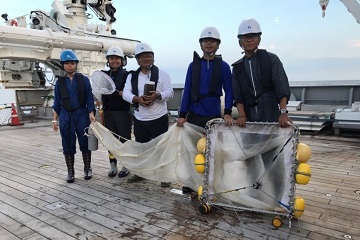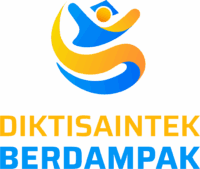IPB Lecturer Attended the Japan’s Shinyo Maru Summer Cruise

Guest researchers from IPB attended the ‘On Board Summer Cruise with T / V Sinyo Maru’ in Japan's Inland Sea on 22nd August – 2ndSeptember 2018. Teaching Staff of the Department of Fisheries Resource Utilization, Faculty of Fisheries and Marine Sciences, Bogor Agricultural Institute (FPIK IPB), Dr . Budy Wiryawan has attended the Shinyo Maru Summer Cruise Training Ship owned by Tokyo University of Marine Science and Technology (TUMSAT) on August 22 – September 2, 2018.
Dr. Budy was invited by Prof. Dr. Jota Kanda (Dean of the Faculty) as a Guest Researcher by TUMSAT to study marine macro and microplastic sampling and analysis techniques. In addition, he also delivered lessons about marine plastic debris research in Indonesia. Dr. Budy was interested in exploring research methodologies relating to the relationship of fishing gear wasted in the sea and the aquatic environment.
Research topics on "Discarded, Abandoned Fishing Gear and Ghost Fishing" are becoming important issues in the world of catch fishes. In Japan, this research is a marine debris (marine waste) study in the framework of a national program in Japan.
The 2018 voyage was carried out by Shinyo Maru Training Ship which was only two years old (GT: 1343; LOAxB: 64 mx 12m) with Toshifumi Mayashi San as the captain. A guest research team from Indonesia and two researchers from SEAFDEC Thailand accompanied by the Program Coordinator (Dr.Keiichi Uchida) departed on August 22, 2018 from Komatsushe Port. Then move to take refuge from Typhoon on 24 August 2018 night to Wakayama on Osaka Bay. The anchor ship was still getting hit by the wind with a speed of between 50-70 knots, so the position of the ship had shifted. "Macroplastics sampling is carried out with a visual observation method, which is carried out from the ship with binocular equipment (binoculars), an arc for estimating object and tab distances with the Android-based marine debris protocol application. While micro plastics sampling, as well as fish larvae, carried out with neuston net with frame dimensions (75×75 cm) equipped with flowmeter, 300 micron meter mesh size with a cod-end in the form of a cylindrical tube with a diameter of 12 cm. Withdrawal of micro plastics nets is carried out at a constant speed of 2-3 knots for 20-30 minutes," said Dr. Budy.
Visual Observation and Neuston net sampling locations were carried out in Osaka Bay, Bingonada Sea and Hiuchinada Sea. The cruise ends on 29 August 2018 at the Port of Shimonoseki. On this shipping opportunity, there was no bottom sediment survey using bottom trawling, because shipping was carried out in the inland sea. Sampling techniques and demonstrations of bottom trawl operations are explained in the lecture hall on board. In addition, discussions about data processing and analysis and estimation of microplastics density per unit area are explained by Dr.Uchida San
Furthermore, micro plastics analysis techniques were carried out at Micro Plastic Laboratory at Kyushu University led by Prof. Atsuhiko Isobe. The on-board summer cruise training will be continued in 2019, after the first activity was followed by Dr. Mochamad Riyanto from IPB in the framework of cooperation between IPB-TUMSAT. It is expected that from this activity research interest in marine plastic debris will be more developed by using valid scientific methods, which in turn increase public and government concerns about the dangers of marine debris. (jhn)



